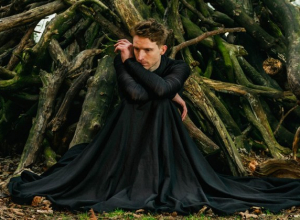As another full-on Irvine Welsh adaptation Trainspotting did in 1996, this bracingly original movie puts a new filmmaker on the map. Not only is this a loud blast of both style and substance, but it refuses to water down its subject matter, taking us through a shockingly profane story in a way that's both visually inventive and emotionally resonant.

This is the story of Bruce (McAvoy), an Edinburgh detective who's determined to beat his colleagues to a promotion. He's also a relentless womaniser, sexist, racist and drug addict. And he'll do anything to get ahead, hiding the sordid details of his private life from his boss (Sessions) while undermining the other cops at any chance while pretending to be their friends. In quick succession, he gets young Ray (Bell) addicted to cocaine, flirts continually with Amanda (Poots), has a fling with the kinky wife (Dickie) of fellow officer Gus (Lewis), torments Peter (Elliott) about his sexuality, and takes Bladesey (Marsan) on a sex-tourism holiday while making obscene calls to his needy wife (Henderson). All of this happens while Bruce leads the investigation into a grisly murder.
McAvoy dives so far into this role that we barely recognise him in there. Bruce is so amoral that we are taken aback by each degrading moment. And yet McAvoy somehow manages to hold our sympathy due to the film's blackly hilarious tone and a startling undercurrent of real emotion. Even though he's a monster, we see his boyish fragility, especially in surreal sequences involving his therapist (Broadbent), which merge with his fantasies, hallucinations and nightmares.
Continue reading: Filth Review









![Luke De-Sciscio talks to us about having the courage to be yourself, forgiving that which is outside of one's control and following whims [EXCLUSIVE] Luke De-Sciscio talks to us about having the courage to be yourself, forgiving that which is outside of one's control and following whims [EXCLUSIVE]](https://images.contactmusic.com/images/home/homepage/luke-de-sciscio-abof-a.jpg)

